中国传统节日英文精品文档
中国传统节日英文版
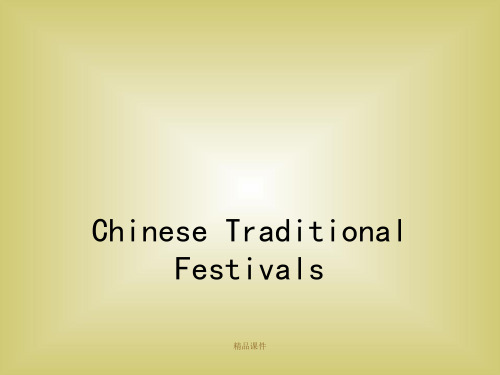
精品课件
Eat yuán xiāo or tāng yuán
精品课件
精品课件
精品课件
The dragon boat Festival
端午节 duān wǔ jié
5th day of the 5th lunar month
精品课件
qīng tuán(S)
zòng zi
Chinese Traditional Festivals
精品课件
Lunar Calendar 农历
nóng lì
精品课件
Chinese Zodiac
精品课件
Spring Festival 春节
chūn jié
Most important Get together
精品课件
Transport during the Spring Festival
精品课件
The Goddess Chang's fly to the moon 嫦娥奔月
Cháng’é bēn yuè
精品课件
Moon Cake 月饼
yuè bǐng
精品课件
Enjoy the glorious full moon with famlies or friends
(Xī’ ān 2016)
精品课件
The Lantern Festival 元宵节
yuán xiāo jié
huā dēng
精品课件
15th day of the 1st lunar month
The carnival of ancient China
精品课件
Customs Guessing lantern riddles
中国传统节日 英文版
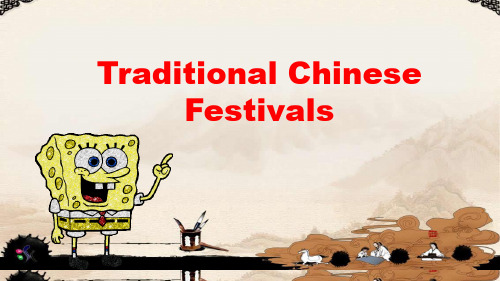
The spring festival 春节 The Lantern Festival 元宵节 Tomb-sweeping Day 清明节 the Dragon Boat Festival 端午节 Double Seventh Day 七夕节 Mid-Autumn Day 中秋节
Double Seventh Day
——Chinese Valentine’s Day
Introduction
• full of romance • It' s on July 7th in the lunar calender each year • The Weaving Girl(织女) and the Cowherd(牛郎 ) in heaven would meet at the Magpie Bridge • Also called Begging-for-Dexterity Festival(乞 巧节)
• Many traditional customs and activities are held on the specified day by people in China and even by some people in neighbouring countries. Among these customs are dragon boat racing, eating zongzi, wearing a perfume pouch(香囊), tying fivecolour silk thread and hanging mugwort leaves(艾叶 ) and calamus(菖蒲).
Mid-Autumn Day 中秋节
中国传统节日英文介绍

Qing Ming
Du Mu( Tang Dynasty )
Qing Ming usually comes with rainy days
பைடு நூலகம்
清明时节雨纷纷, 路上行人欲断魂, 借问酒家何处有, 牧童遥指杏花村.
I ask a Buffalo boy for tavern ['tævən] to release my sadness Passengers on the way are full of soreness
He points to the village covered by apricot ['eiprikɔt] blossoms
Chinese Valentine’s Day
The seventh day of the seventh month of the lunar calendar is known as Qi Xi Jie or Qiqiao Jie, a traditional holiday that has been recently called China's Valentine's Day.
In China, the most traditional and popular Spring Festival food is dumpling, which looks like the moon with vegetables and meat mixed in it. The Chinese name of dumpling is “JIAO ZI”, ”JIAO” means ”cross”, ”ZI” is Chinese traditional time represents “24:00”, so the Chinese word “JIAO ZI” means “cross 24:00”, just the dividing point of last year and next year. So when it comes to 24:00, every family begins eating dumplings.
中国传统节日 英文版
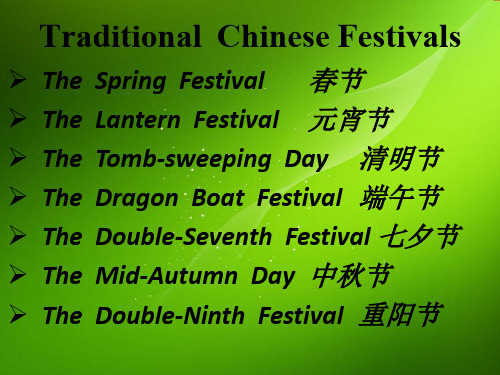
The Tomb-sweeping Day
Time It usually ranges from April 4th to April 6th in the Gregorian calendar of each year. Status It’s the most important festival of worship , and the most suitable for offering sacrifices to the ancestors and sweeping their grave. Of course, it’s also one of the four legal holidays. Origin and History It began about the Zhou Dynasty , having a history of over 2,500 years. Because people usually go out to relax themselves in the period, so it’s also called Outing Festival. Custom ① Sweeping the grave 扫墓
Logo
Pictures
The on January 15th in the lunar calendar of the new year, Which is the last day of the Spring Festival. Status It’s also an very important traditional festival, for it’s the first night when the moon turns to be full and bright of the new year. Origin and History As early as the Han Dynasty , it has been used as a day for sacrificing to the Emperor of Heaven and praying for blessing . Although time flies and all changes, it’s still popular with the people.
中国传统节日中英文对照
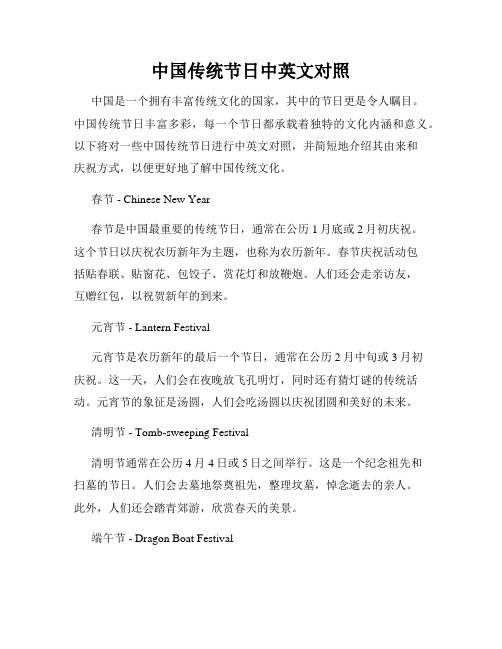
中国传统节日中英文对照中国是一个拥有丰富传统文化的国家,其中的节日更是令人瞩目。
中国传统节日丰富多彩,每一个节日都承载着独特的文化内涵和意义。
以下将对一些中国传统节日进行中英文对照,并简短地介绍其由来和庆祝方式,以便更好地了解中国传统文化。
春节 - Chinese New Year春节是中国最重要的传统节日,通常在公历1月底或2月初庆祝。
这个节日以庆祝农历新年为主题,也称为农历新年。
春节庆祝活动包括贴春联、贴窗花、包饺子、赏花灯和放鞭炮。
人们还会走亲访友,互赠红包,以祝贺新年的到来。
元宵节 - Lantern Festival元宵节是农历新年的最后一个节日,通常在公历2月中旬或3月初庆祝。
这一天,人们会在夜晚放飞孔明灯,同时还有猜灯谜的传统活动。
元宵节的象征是汤圆,人们会吃汤圆以庆祝团圆和美好的未来。
清明节 - Tomb-sweeping Festival清明节通常在公历4月4日或5日之间举行。
这是一个纪念祖先和扫墓的节日。
人们会去墓地祭奠祖先,整理坟墓,悼念逝去的亲人。
此外,人们还会踏青郊游,欣赏春天的美景。
端午节 - Dragon Boat Festival端午节是一个具有悠久历史的节日,通常在公历6月初庆祝。
这个节日源于纪念古代爱国诗人屈原,也是一项庆祝夏天到来的活动。
人们会参加龙舟赛、包粽子和挂艾草。
象征食物是粽子,人们吃粽子以保护自己免受邪恶和疾病的侵袭。
中秋节 - Mid-Autumn Festival中秋节是农历八月十五,通常在公历9月底或10月初庆祝。
这个节日庆祝秋天的丰收和团圆。
人们会赏月、品尝月饼以及举办家庭聚会。
月饼是中秋节的特色食物,馅料的种类多样,寓意着团圆和祝福。
重阳节 - Double Ninth Festival重阳节通常在公历9月初或10月底庆祝,也被称为老人节。
此节日的由来与古代传说有关,人们会爬山、采菊、追溯阳光,并祝福年长的亲人和朋友。
重阳节也是缅怀祖先和尊重老年人的时间。
中国传统节日优秀英语范文
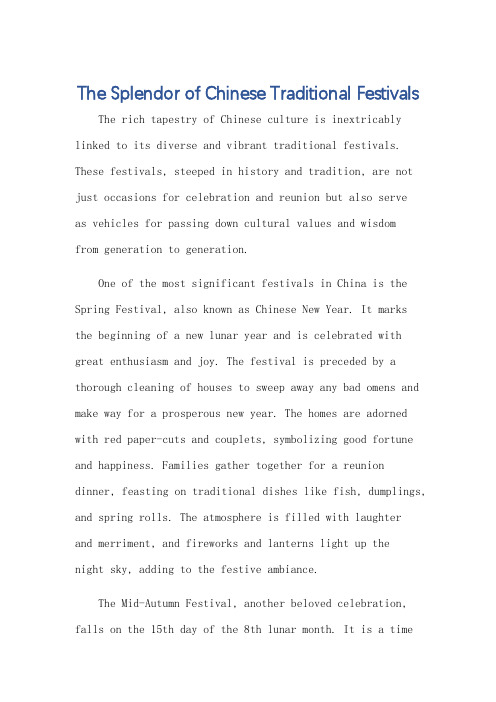
The Splendor of Chinese Traditional Festivals The rich tapestry of Chinese culture is inextricably linked to its diverse and vibrant traditional festivals. These festivals, steeped in history and tradition, are not just occasions for celebration and reunion but also serveas vehicles for passing down cultural values and wisdomfrom generation to generation.One of the most significant festivals in China is the Spring Festival, also known as Chinese New Year. It marks the beginning of a new lunar year and is celebrated with great enthusiasm and joy. The festival is preceded by a thorough cleaning of houses to sweep away any bad omens and make way for a prosperous new year. The homes are adorned with red paper-cuts and couplets, symbolizing good fortune and happiness. Families gather together for a reunion dinner, feasting on traditional dishes like fish, dumplings, and spring rolls. The atmosphere is filled with laughterand merriment, and fireworks and lanterns light up thenight sky, adding to the festive ambiance.The Mid-Autumn Festival, another beloved celebration, falls on the 15th day of the 8th lunar month. It is a timefor family reunions and appreciation of the full moon, which is considered a symbol of completeness and harmony. Mooncakes, a traditional delicacy, are shared among family members, each containing a sweet filling wrapped in a delicious pastry crust. Legends and folk stories are often recounted around the moonlit evening, adding a mystical and enchanting touch to the festival.The Dragon Boat Festival, celebrated in memory of the ancient patriot Qu Yuan, is another festival that showcases the rich cultural heritage of China. The festival is marked by dragon boat races, a thrilling spectacle that draws crowds of spectators. Teams of oarsmen dressed in colorful costumes paddle their long, dragon-shaped boats with great gusto, competing for the honor of being the fastest. Additionally, traditional foods like zongzi (rice dumplings wrapped in bamboo leaves) are prepared and eaten to commemorate Qu Yuan's life and works.These festivals are not just about celebration and feasting; they also serve as powerful reminders of China's rich cultural roots. Through them, the values of family, harmony, and patriotism are instilled in the youngergeneration, ensuring that these traditions are carried forward for generations to come.In conclusion, the splendor of Chinese traditional festivals lies not only in their vibrant celebrations and delicious food but also in the deep cultural significance they hold. These festivals are a testament to theresilience and continuity of Chinese culture, and they continue to play a vital role in binding the Chinese people together,不论他们身在何处。
中国传统节日英文介绍
中国传统节日英文介绍China's nal XXXEvery country has its own customs and cultures。
and China is no n。
With the development of n。
it'XXX' ns。
Here are some of China'XXX:New Year's Day - 元旦Falling on the first day of the year。
New Year's Day marks the beginning of a new year。
People plan what they want to achieve in the ing year。
believing that a good start in spring will XXX.Spring Festival - 春节Spring XXX China。
celebrated on the first day of the first lunar month。
On the eve of the festival。
people paste springpoems with lucky words and prepare us food。
with dumplings being a must。
They also clean their house。
but avoid XXX.Lantern Festival - 元宵节XXX day of the first lunar month。
People XXX written on them。
They also eat sweet glutinous rice balls。
called XXX。
XXX and happiness.Dragon Boat Festival - 端午节XXX of the poet Qu Yuan。
中国的传统节日英语四篇(优秀)
中国的传统节日英语四篇(优秀)中国的传统节日英语篇一to the chinese people it is as important as christmas to people in the west.spring festival is the most importantand popular festival in spring festival ,the people usually clean and decorate their they go to the flower fairs to buy some flowers.during spring festival ,the adults usually give lucky money to often get together and have a big people eat dumpling for dinner.i love spring festival .中国的传统节日英语篇二hi! tom,i’m glad to hear that you are interested in traditional chinese festivals.my favorite festival is the mid-autumn festival.it usually es in september or october. on that day, our family members usually get together and have anice meal. after that, i always admire the moon and share mooncakes with my families.i love this festival because i like eating mooncakes. they are in the shape of a full moon. they carry people’s wishes to the families they love and miss.in short, the mid-autumn festival is a day of pleasure and happiness. i hope that my letter will help you know more about chinese festivals.yours,li hua中国的传统节日英语篇三when the traditional festival es, everybody is excited about it, because they will have holiday to relax. the meaning of these festivals is remembered by the old generation all the time, while some young people do not know. so when we enjoy the holiday, we need to know more about the traditional culture.大家都会很兴奋得知有传统节日将要降临时,因为他们会有假期来放松自己。
Word——中国传统节日英文版
Traditional Festivals in ChinaT raditional festivals are important events in the life of every Chinese, beginning right from childhood. Festivals such as the Chinese New Year, the Dragon Boat Festival, the Mid-Autumn Festival, and the Winter Solstice are more or less evenly distributed across the four seasons. In China's traditional agricultural society, festivals served to mark the passing of time.L et's take a close look to these festivals:The Lantern FestivalT he Lantern Festival is on the 15th of the first lunar month. That night there is a full moon, and every household is decorated with colorful lanterns and prepares yuanxiao. Yuan Xiao, a kind of round dumpling make of glutinous rice flour sweet or salted fillings, which is boiled or fired. Yuan Xiao, literally "the night of the first full moon", which is another name for the festival. When night falls, people go into the street, where exquisite lanterns of diverse designs are hung. Some are pasted with riddles for the passers-by to solve.I t is said that after the Yuan Dynasty (1206-1368) destroyed the Jin (1115-1234), the band of the Yuan army celebrated the victory with gongs and drums. Since then beating gongs and drums has been a local tradition to express joy and happiness.I n the country and town, people celebrate it heartily. For some reason, there is often a bigger celebration in the rural areas, especially in the North. The most popular food for this festival is yuanxiao. Apart from yuanxiao, the customary foods vary from place to place. In Shanxi Province, people take yuanxiao tea, a sort of soup made of boiled flour mixed with vegetables and fruits; in Luoyang and Lingbao, Henan Province, people favor jujube paste; in Kunming, Yunnan Province, people prefer bean dough. Other folk customs of the Lantern Festival include attending the lantern fair, guessing riddles and performing traditional festivities.Dragon boat festivalVarious perfume bags glutinous rice dumpling (zongzi)The Spring festivalFamily CelebrationO n the last day of the old year, everyone was busy either in preparing food for the next two days, or in going to the barbers and getting tidied up for the New Year’s Day. Tradition stipulated that all food be pre-pared before the New Year’s Day, so that all sharp instruments, such as knives and scissors, could be put away to avoid cutting the "luck" of the New Year. The kitchen and well were not to be disturbed on the first day of the Year. The New Year’s Eve and New Year’s Daycelebrations were strickly family affairs. All members of the family would gather for the impo rtant family meal on the evening of the New year’s Eve. Even if a family member could not attend, an empty seat would be kept to symbolize that person’s presence at the banquet. At midnight following the banquet, the younger members of the family would bow and pay their respects to their parents and elders.Lai-SeeO n New Year’s Day, the children were given Red Lai-See Envelopes , good luck money wrapped in little red envelopes. On New Year’s day, everyone had on new clothes, and would put on his best behavior. It was considered improper to tell a lie, raise one’s voice, use indecent language, or break anything on the first day of the year. Starting from the second day, people began going out to visit friends and relatives, taking with them gifts and Lai-See for the children. Visitors would be greeted with traditional New year delicacies, such as melon seeds, flowers, fruits, tray of togetherness, and NIANGAO, New Year cakes.The moon festivalO n the 15th day of the 8th month of the lunar calendar, there is a Harvest moon. Some countries call it Harvest Festival. Here in China, they call it the Mid-Autumn festival, Chinese culture is deeply imbedded in traditional festivals. Just like Christmas and Thanksgiving in the West, the Moon Festival is one of the most important traditional events for the Chinese.T he Moon Festival is full of legendary stories. Legend says that Chang Er flew to the moon, where she has lived ever since. You might see her dancing on the moon during the Moon Festival.T he Moon Festival is also an occasion for family reunions. When the full moon rises, families get together to watch the full moon, eat moon cakes, and sing moon poems. With the full moon, the legend, the family and the poems, you can't help thinking that this is really a perfect world. That is why the Chinese are so fond of the Moon Festival.A s every Chinese holiday is accompanied by some sort of special food. on the Moon Festival, people eat moon cakes, a kind of cookie with fillings of sugar, fat, sesame, walnut, the yoke of preserved eggs, ham or other material. Some moon cakes are of very high quality and very delicious. An overseas tourist is advised not to miss it if he or she happens to be in China during the Moon Festival.T he Moon Festival is also a romantic one. A perfect night for the festival is if it is a quiet night without a silk of cloud and with a little mild breeze from the sea. Lovers spend such a romantic night together tasting the delicious moon cake with some wine while watching the full moon.T here are also many other traditional festivals in China, such as The Chinese Valentine's day(七夕节—中国情人节),Double Ninth Day (重阳节) and Water Sprinkling Day (傣族泼水节)H ope all the Chinese traditional festivals will bring you happiness.。
chinese festivals中国传统节日英语介绍
精品课件
24 节 气 图
Twenty-four solar terms
精品课件
April 4-6 one day before
combine
精品课件
《清明》 -----(唐)杜牧
清明时节雨纷纷 It drizzles thick and fast
on
the Pure Brightness Day,
country . 精品课件
Eat Zongzi
a pyramid-shaped dumpling made of glutinous rice and wrapped in bamboo or rfieresdt plereavpeasred as sacrificial offerings for Qu Yuan's departed soul and dropped into the river to protect him from being eaten by fish
精品课件
菠菠粿
special food
乌稔饭
枣糕
清明果
精品课件
蒸朴籽粿 青团子
精品课件
the fifth day of the fifth month of the Chinese lunar calendar
精品课件
It is celebrated in memory of Qu Yuan,a patriot poet and loyal minister of the State of Chu during the Warring States Period.He drowned himself in protest against the rule of the
